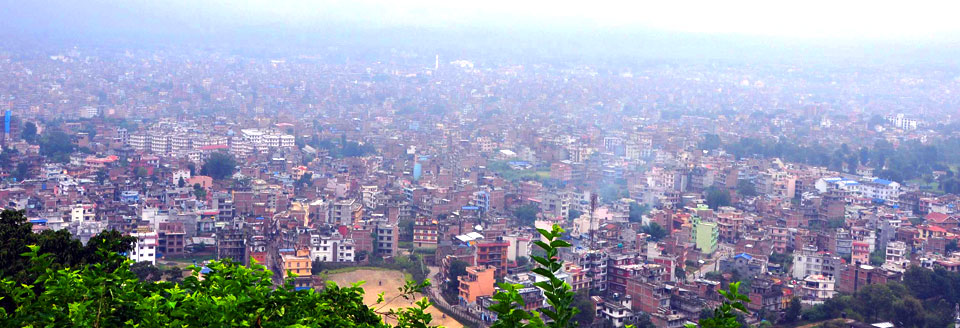

A forgettable year for tourism ?
Uncrowded tourist destinations, empty hotel rooms, fewer trekkers and mountaineers, and less hustle and bustle at Tribhuvan International Airport (TIA). These things describe how the year 2015 was for Nepali tourism industry.
Even though the first three months of 2015 was normal, the tourism industry took a severe beating after the earthquake of April 25 which not only floored buildings, heritage sites and the tourism industry but also shattered the hearts of Nepali people. Tourist arrival figure is the yardstick to measure success of tourism industry. Rough estimates show tourist arrivals fell by 56 percent to around 350,000 in 2015 compared to around 800,000 recorded last year.
According to World Travel and Tourism Council (WTTC), direct contribution of tourism to Gross Domestic Product (GDP) was 4.3 percent in 2014. It was expected to grow to 5.4 percent in 2015. But tourism entrepreneurs say it is expected to go down to 2 percent.
Industry people say the bad day for the industry started in October 2014 when blizzards triggered by Hud Hud cyclone killed 48 trekkers and guides in October -- the peak season for Nepali tourism. Tourism entrepreneurs say the first three months of tourism industry was not that good because of the impact of the Annapurna blizzards.
Two months later, a deadly earthquake rocked the country which hit the tourism industry hard. As the industry was gradually recovering, Nepal on September 20 promulgated a new constitution which made industry people optimistic of better days ahead. They were hopeful that the autumn season could take the industry back on track. However, things do not go as planned.
“Tarai unrest and the Indian blockade traumatized our industry like never before,” Rajan Simkhada, owner of Earthbound Expeditions, said.
Earthbound Expeditions, which had handled 2,175 tourists in 2014, could serve only 593 tourists in 2015.
The decision to transfer Nepal Mountaineering Association (NMA) peaks to government control also received international criticism which also affected the industry according to industry people.
IMPACT ON DIFFERENT SECTORS
Tashi Lakpa Sherpa, senior vice president of Trekking agencies Association of Nepal (TAAN), said the trekking business was down by 40 percent this year. “To revive the sector, the government should immediately implement our proposal to extend validity of mountaineering permits issued by Department of Tourism (DoT) for two more years,” he added.
Similarly, DB Limbu, president of Nepal Association of Tour and Travel Agents (NATTA), said ticketing business is down by 35 percent. “Similarly, only 20 percent of the tourists, who booked their holidays, came to Nepal this year. Hotel occupancy was only around 20 to 30 percent,” he added.
Vinayak Shah, general secretary of Hotel Association of Nepal (HAN), said operating cost of hotels has increased by 30 to 40 percent due to shortage of essential commodities and fuel. “The hotel industry is losing revenue of more than Rs 100 million every day,” he added. “As hotels and restaurants cannot compromise on quality, more than 100 hotels and restaurants have been closed temporarily as they cannot continue to bear loss.” Shah also said hotels and restaurant that are in operation have been facing problem in paying staff's salary, utility bills, bank's interest and principal, in time.
“Our problems at present are similar to that of conflict days,” he added.
However, the year 2015 has reduced sectoral gap among tourism bodies. Prachanda Man Shrestha, former CEO of Nepal Tourism Board (NTB), said that all tourism related bodies are now united and are working hard for survival and revival of the industry. “The appointment of new CEO at NTB is a result of this unity,” he added.
The formation of National Tourism Promotion Committee for post-quake revival of tourism industry was another major achievement of 2015. “The issues identified by the committee have to be studied and its suggestions have to be implemented so that Nepal can again be reestablished in the international market,” Shrestha added.
APPOINTMENT OF NEW CEO MAKES INDUSTRY OPTIMISTC
Despite the crisis, the recent appointment of Deepak Raj Joshi as the CEO of NTB has brought high hopes among the private sector.
Hari Sarmah, CEO of NATTA, said that industry has seen a silver lining in the dark cloud with the appointment of new CEO at NTB. “But it all depends on how the marketing and promotion strategies are made. Different tools like media, word of mouth, building people to people relationship, identifying potential market, and promoting in the right time can help boost the confidence of the industry,” he added.
Right after the earthquake, the industry needed to regain the confidence of national as well as international operators. But it could not happen due to lack of leadership at NTB. “Now it is the major responsibility of the new CEO to boost the confidence of the operators and use newer strategies for bringing in tourist from countries like India and China whose outbound flow is very high. This will help in faster revival of the industry,” said Shrestha.
source:kriti bhuju, republica,30 dec 2015








